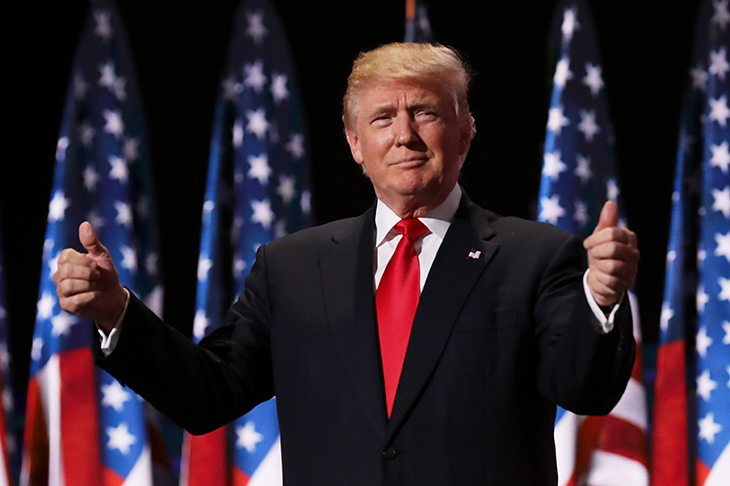Strictly in terms of its implications for the succession, the arrival of the Duke and Duchess of Sussex’s son this week was not the most important of royal births. The boy has been born seventh in line to the throne, but that position can be expected to fall rapidly once the Cambridge children begin to marry. He is not born to be king, and may never even be granted the title of prince. Nevertheless, the birth has attracted wide attention and celebration, inspiring front-page headlines on foreign newspapers and eliciting interest in Britain from types of people who don’t normally care about royal events.
Partly this is down to the new baby’s parentage. For the first time — at least to our knowledge — we have a British royal baby born to an American mother and with an Afro-Caribbean heritage. But it is hard not also to view the interest shown towards the youngest royal in the context of the current political tumult. This serene event contrasts so greatly with the squabbling of our political leaders, and in doing so reminds us of what is so strong about the system of constitutional monarchy. While the grubby, and necessary, business of politics is carried out by our elected representatives, the stability of our nation is represented by a head of state who stays aloof from it all. Britain’s small band of committed republicans must answer the question: what would it add to our national life to have, say, Tony Blair or David Cameron installed in Buckingham Palace as titular president, unable to resist the temptation to poke their noses into the business of Brexit?
Of course, it is essential to the workings of a constitutional monarchy that the monarch does not interfere in politics. But that is more easily done when the figure fulfilling this role has been born into royal duty. That is why royal births become such important events in national life — they are a reminder that the role of a potential monarch starts at the very beginning of life.
Yet, in spite of the extraordinary nature of their lives, we find it easier in many ways to relate to the royal family than to our politicians. The rhythms of royal news are so much more aligned with our own life experience. Few of us will ever stand for public office, but most of us will at some point have children or will see other members of our families bring new life into the world. We appreciate how families grow, how they pass the torch down through the generations — and how, as the Sussexes demonstrate so well, they interweave.
The new baby’s broad genealogy has been described as a sign of modernity — people of mixed ethnicity are the fastest–growing group in Britain, after all. It is reassuring, too, that the pressure exerted by overbearing courtiers on royals over their choices of spouse — which led to the damaging series of failed marriages in the Queen’s children’s generation — has been relaxed.
Princes William and Harry have been much freer in their choice of partner than their father was. But there is nothing new in royal families reaching beyond narrow genetic pools for marriage partners. Prince Harry himself is part British, part German, part Greek. The rest of the population, with greater opportunities to travel than in the past, have simply caught up with a practice — marrying across borders — which has been usual in royal life for many centuries.
It was fashionable for many years among people of liberal mind to denigrate marriage. It was attacked as an outdated, patriarchal institution — in spite of ample evidence that children raised within marriage have a far better life experience, having better health and being more successful in education. (But then attacking marriage was more about the selfishness of the adults, who were seen to be neglecting the interests of their children.) But opinions seem to have changed subtly over the past few years. There are fewer people now trying to make out that marriage is in itself some kind of ritualised way of suppressing women. People who were once apt to argue this are now among the strongest supporters of gay marriage — and, having made the argument for equality, can hardly rant against heterosexual marriage.
There has been a change, too, in attitudes towards royal marriages. Many people who would once have sneered at the pomp surrounding royal weddings, and the attention paid to them, were nevertheless enthused by the wedding of Harry and Meghan — and this enthusiasm has carried through to the birth of their first child.
Republicans — of the British kind — are in retreat. Meanwhile, our own royal family has recovered from a dark period and regained much of the respect it had lost. However low our national stock may temporarily have sunk owing to parliament’s indecisiveness over Brexit, our royal family is a reminder of what makes Britain such a stable and beneficial influence on the rest of the world.
Got something to add? Join the discussion and comment below.
Get 10 issues for just $10
Subscribe to The Spectator Australia today for the next 10 magazine issues, plus full online access, for just $10.
You might disagree with half of it, but you’ll enjoy reading all of it. Try your first month for free, then just $2 a week for the remainder of your first year.














Comments
Don't miss out
Join the conversation with other Spectator Australia readers. Subscribe to leave a comment.
SUBSCRIBEAlready a subscriber? Log in